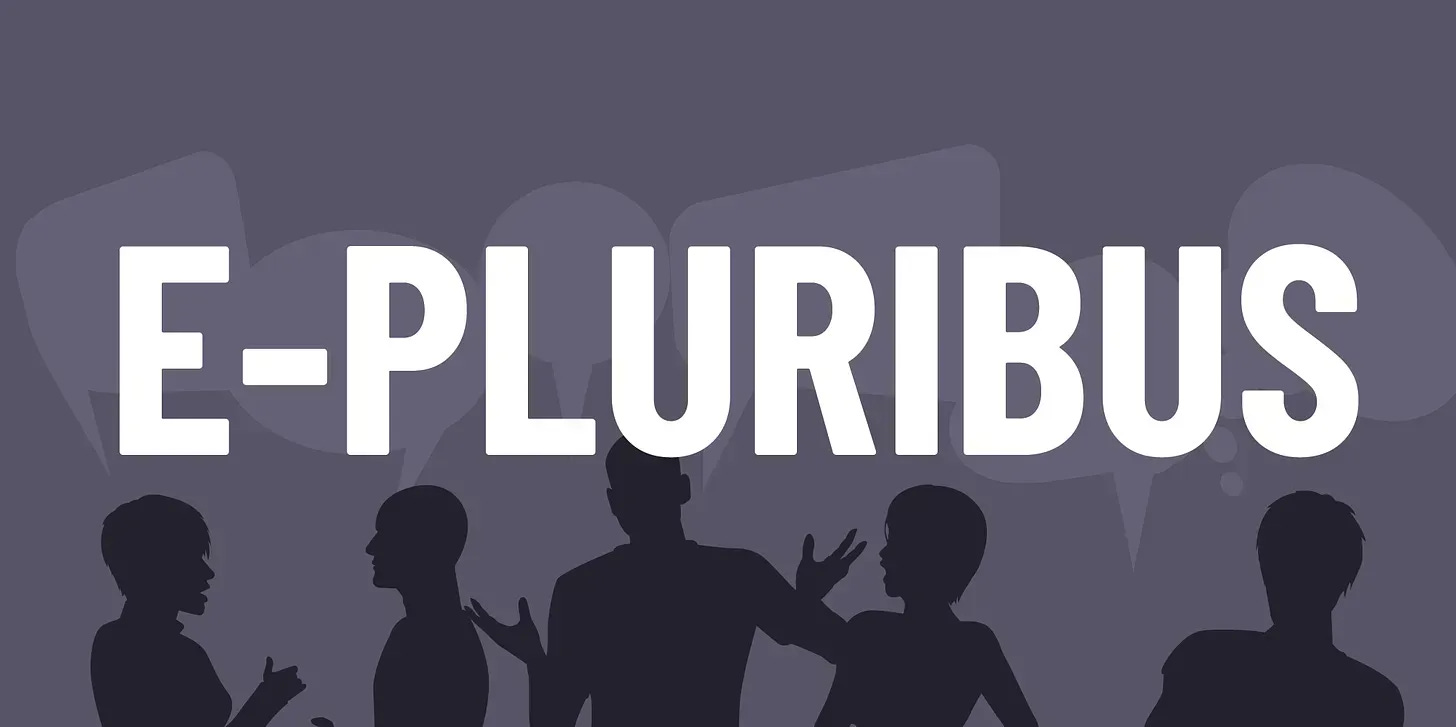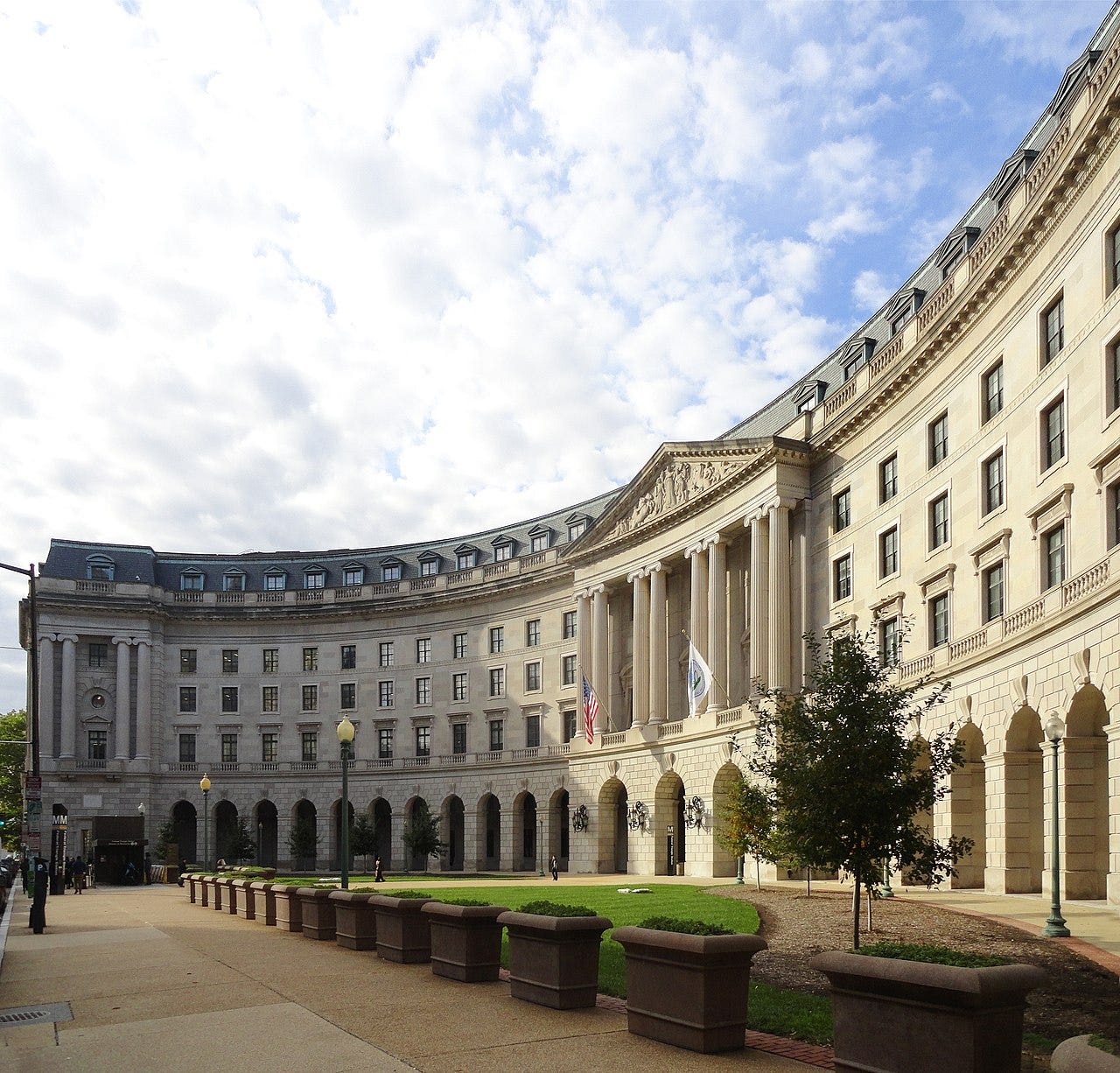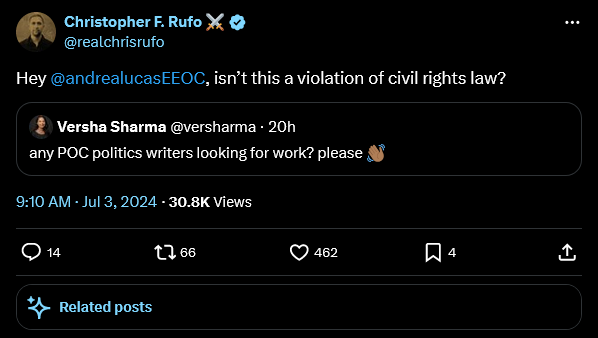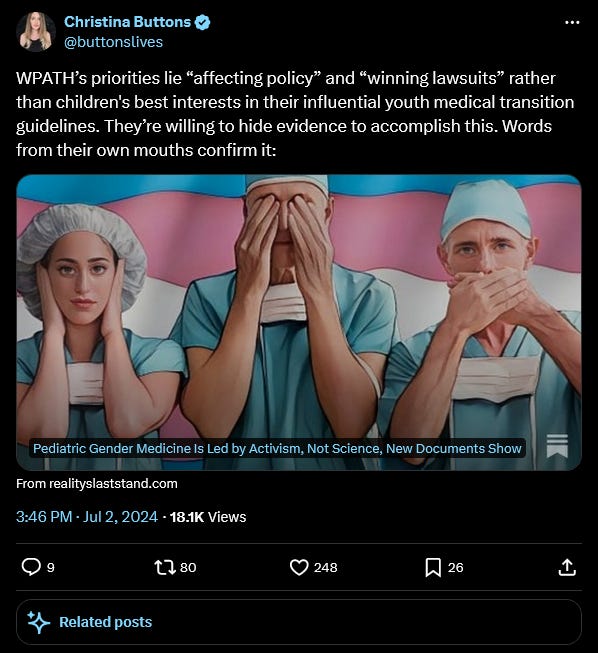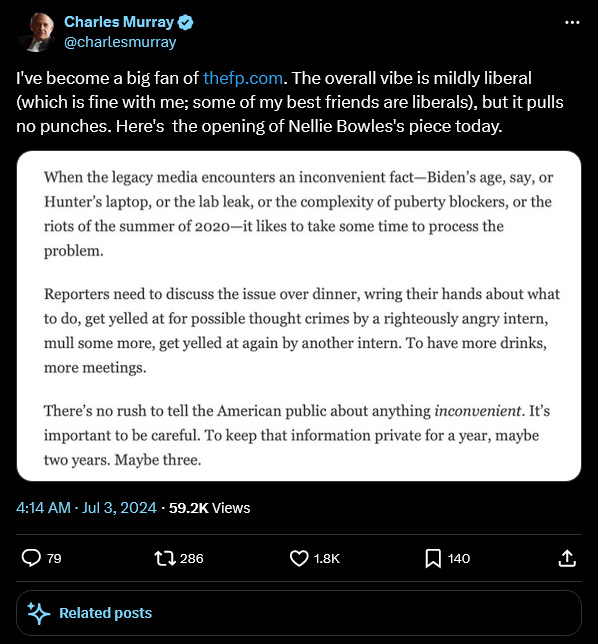E-Pluribus | July 3, 2024
Yesterday's misinfo is today's truth; do we need liberalism to be free? The administrative state harms the 'little guy.'
A round-up of the latest and best musings on the rise of illiberalism in the public discourse:
Timur Kuran: How ‘Misinformation’ Becomes Common Knowledge
Humans like to think of ourselves as rational truth-seekers. In reality, being consistently honest is more challenging than we let on.
Using the recent presidential debate as a springboard, political scientist Timur Kuran explains the psychology of rapidly converting “misinformation” into fact. Put briefly, we often deny what we know is true until we can say it openly without being ostracized. Unfortunately, this sort of fair-weather honesty can wreak havoc on public discourse:
Until Thursday night’s CNN debate, a majority of Democrats were afraid to tell a basic truth in public—to say openly what they know about Joe Biden’s physical and mental health—for fear of emboldening Donald Trump or taking a position that may seem adverse to their party. So they kept their knowledge of his declining cognitive abilities private and, in public, conveyed impressions and issued reports at odds with their own senses.
If they felt that a different candidate had a higher chance of beating Trump, with rare exception they kept that preference hidden and pretended to agree with the idea, repeated ad infinitum, that Biden remained the party’s best hope.
Preference and Knowledge Falsification
Why did they do this? Fear. Fear, in this case, of being punished by their fellow Democrats.
Fear of being punished by a crowd is not unique to Democrats, or liberals, or Americans. It is an innate human response to the dangers of being ostracized, to being cut off from friendships and privileges that are critical to survival. We are born with a need for social acceptance. That need is what drives knowledge falsification and preference falsification.
…
Knowledge and preference falsification pollute the bodies of information that individuals use in developing their understandings of the world and their rankings among options. They misinform the polity about what is known and preferred. They conceal feasible options. They obscure the extent of support for changing direction. In fostering a culture of mendacity, they hinder the identification of discontent and compound the difficulties of forming coalitions among people eager to switch course.
Ed Feser: Postliberalism without Despotism
Champions of liberalism point to free speech, constitutional government and markets as blessings bestowed by their preferred political philosophy. Writing at The Postliberal Order, Ed Feser, whose work we’ve highlighted previously, says we can maintain these hallmarks of a free society (at least in some form) without the liberal justifications typically employed to defend them. His takeaway? A postliberal society need not be a police state:
The rule of law; constitutional constraints on government; the separation of powers; free and fair elections to determine who holds public office; the market economy; free speech and the critical evaluation of ideas that it makes possible; due process; and so on. Defenders of liberalism point to the benefits of these institutions as an argument for their creed. They also sometimes speak as if to criticize liberalism is ipso facto to advocate doing away with these institutions – as if being postliberal entails favoring dictatorship, totalitarianism, a police state, socialism,and similar political bogeymen.
It is hard to know what to say about such silliness other than that it is very silly indeed. The late Michael Novak drew an important distinction between liberal philosophy and liberal institutions. Institutions like the ones just named are often thought of as paradigmatically liberal. This is not quite right, since, at least in some form or other, they predate modernliberalism. But it is true that liberalism has made these institutions central to its understanding of political life, and has deeply influenced the modern world’s understanding of them. All the same, the institutions themselves are different from the various systems of liberal political philosophy that might be used to ground and interpret them (such as the systems of Locke, Smith, Mill, Hayek, or Rawls).
Of course, a critic of liberal political philosophy might reject one or more of the institutions in question wholesale, and certainly would not accept them in quite the forms liberalism advocates. The point is that he need not reject them in all their forms. For example, one might see the value of elections as a means of determining who holds office, without accepting Locke’s assumption that political authority is a product of consent rather than having any natural basis.
One might see the value of free debate without entirely endorsing Mill’s particular justification of it, or taking the right to free speech to be as absolute as he and other liberals do. One can acknowledge the advantages of market mechanisms while disagreeing with Smith or Hayek about exactly which sorts of interference with market outcomes are justifiable. One can acknowledge Rawls’s point that modern polities need to be sensitive to the problems posed by pluralism, without accepting his view that it is possible or desirable for the state to be neutral between all reasonable comprehensive doctrines.
Jacob Sullum: Two SCOTUS Cases Show How an Unaccountable Administrative State Hurts 'Ordinary People'
As we mentioned yesterday, many pundits have chastised the Supreme Court for limiting the power of executive agencies. These expert-led bureaucracies (like the EPA pictured above) look out for “ordinary people,” and the Court has now deprived them of the authority they need to do this. Jacob Sullum at Reason calls shenanigans:
After the U.S. Supreme Court curtailed the powers of federal agencies in two cases last week, progressive critics predictably complained that the decisions favored "big business," "corporate interests," and "the wealthy and powerful." That gloss overlooked the reality that people with little wealth or power frequently are forced to contend with overweening bureaucrats who invent their own authority and play by their own rules.
In the more consequential case, the Court repudiated the Chevron doctrine, which required that judges defer to a federal agency's "permissible" interpretation of an "ambiguous" statute. The majority said that rule, which the Court established in 1984, was unworkable, creating "an eternal fog of uncertainty" about what the law allows or requires, and fundamentally misguided, allowing the executive branch to usurp a judicial function.
Although People for the American Way perceived a win for "the corporate interests that have been itching to gut the power of federal agencies to protect our health and welfare," the dispute at the center of the case complicates that picture. Two family-owned fishing operations objected to onerous regulatory fees they said had never been authorized by Congress.
In a concurring opinion, Justice Neil Gorsuch noted other examples of vulnerable supplicants who suffer when agencies are free to rewrite the laws under which they operate. He cited cases involving a veteran seeking disability benefits and an immigrant fighting to remain in the country.
Because of an arbitrary rule that the Department of Veterans Affairs invented for its own convenience, Thomas Buffington lost three years of disability benefits that the government owed him. Alfonzo De Niz Robles faced deportation and separation from his American wife and children after the Board of Immigration Appeals overturned a judicial precedent on which he and many other immigrants had relied for relief.
"Sophisticated entities and their lawyers may be able to keep pace with rule changes affecting their rights and responsibilities," Gorsuch noted. They can lobby for "reasonable" agency interpretations and "even capture the agencies that issue them."
By contrast, Gorsuch added, "ordinary people can do none of those things." They are "the ones who suffer the worst kind of regulatory whiplash" when the law changes according to bureaucratic whims.
Around Twitter (X)
Is race-based hiring a violation of civil rights law? Chris Rufo would like to know:
Christina Buttons says the campaign for youth gender medicine is driven by activism rather than science, according to the activists themselves:
Finally, Charles Murray explains the source of his admiration for the Free Press: they don’t shy away from criticizing the media as necessary, a practice we at Pluribus also admire:



